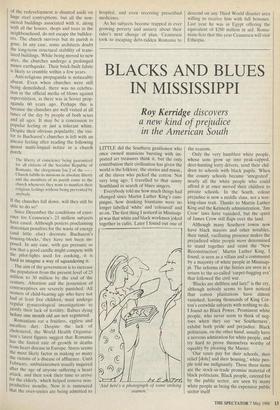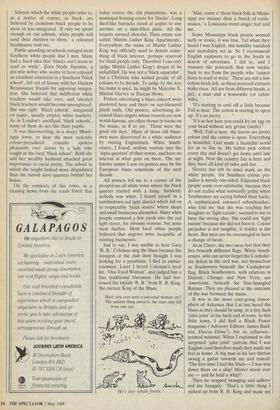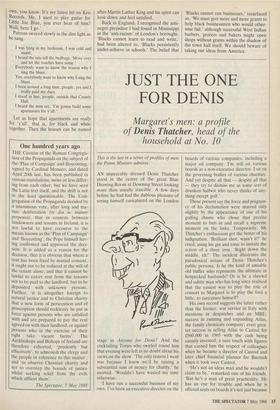BLACKS AND BLUES IN MISSISSIPPI
Roy Kerridge discovers
a new kind of prejudice in the American South
LITTLE did the Southern gentlemen who once owned mansions bursting with im- ported art treasures think it, but the only contribution their civilisation has given the world is the folklore, the stories and music, of the slaves who picked the cotton. Not very long ago, I travelled to that sunny Southland in search of blues singers.
Everybody told me how much things had changed since Martin Luther King's cam- paigns, how drinking fountains were no longer labelled 'white' and 'coloured' and so on. The first thing I noticed in Mississip- pi was that white and black workmen joked together in cafés. Later I found out one of
'And here's a photograph of some striking seamen.'
the reasons.
Only the very humblest white people, whose sons grow up into peak-capped, deer-hunting lorry drivers, send their chil- dren to schools with black pupils. When the county schools became 'integrated', nearly all the white people who could afford it at once moved their children to private schools. In the South, colour prejudice is now a middle class, not a wor- king-class trait. Thanks to Martin Luther King and the Kennedy administration, 'Jim Crow' laws have vanished, but the spirit of James Crow still flaps over the land.
Although many Southern towns now have black mayors and other notables, their timid, vacillating presence makes the prejudiced white people more determined to stand together and resist the 'New Reconstruction'. Martin Luther King, I found, is seen as a villain and a communist by a majority of white people in Mississip- pi. The reforms of the Sixties are seen as a return to the so-called 'carpet-bagging era' that followed the civil war.
'Blacks are shiftless and lazy!' is the cry, although nobody seems to have noticed that cotton plantations have almost vanished, leaving thousands of King Cot- ton's erstwhile subjects with nothing to do. I found no Black Power. Prominent white people, who never seem to think of neg- roes when they say 'we Southerners', exhibit both pride and prejudice. Black politicians, on the other hand, usually have a nervous admiration for white people, and try hard to prove themselves worthy of equality by pleasing the Master. "
'Our taxes pay for their schools, their relief [dole] and their housing,' white peo-
ple told me indignantly. These three items are the stock-in-trade promise material of black politicians. Black people, catered for by the public sector, are seen by many white people as being the expensive public sector itself Schools which the white people refer to, as a matter of course, as black, are believed by credulous black people to be more or less integrated. 'If only we spend enough on our schools, white people will send their children to them,' a coloured headmaster told me.
Public spending on schools enraged most Southern white people that I met. Many had a fixed idea that 'blacks can't learn to read or write'. Zora Neale Hurston, a pre-war writer who seems to have enjoyed an excellent education in a Southern 'black school', fell out of favour with her Harlem Renaissance friends for opposing integra- tion. She believed that indifferent white teachers would take over, and talented black teachers would become unemployed. She was right. 'Black schools', integrated on paper, usually employ white teachers. As in London's unofficial 'black schools', many of them do not like their pupils.
It was disconcerting, in a sleepy Missis- sippi town, to hear the most violently colour-prejudiced remarks spoken pleasantly over dinner by a lady who taught in the local 'black school'. Both she and her wealthy husband attached great importance to racial purity. The school in which she taught looked more dilapidated than the ruined slave quarters behind her house.
On the outskirts of this town, in a clearing hewn from the scrub forest that today covers the old plantations, was a municipal housing estate for 'blacks'. Long shed-like barracks stood at angles to one another on a dust-filled plain. All the tenants seemed cheerful. Their estate was called 'Martin Luther King Apartments'. Everywhere the name of Martin Luther King was officially used to denote some- thing of black interest, perhaps reserved for black people only. Therefore I can only judge Martin Luther King's dream to be unfulfilled. He was not a 'black separatist', but a Christian who wished people of all colours to be friends. To judge by the way his name is used, he might be Malcolm X, Marcus Garvey or Darcus Howe.
Posters advertising a blues concert were plastered here and there on sun-blistered plank walls. Old posters, advertising de- ceased blues singers whose records are now world-famous, are often shown in books on the music, as if to say, 'Those were the good old days.' Many of those old blues- men were discovered to a white audience by visiting Englishmen. White South- erners, I found, seldom venture into the 'sepia quarters' of their towns, and have no interest in what goes on there. The un- known names I saw on posters may be the European blues sensations of the next decade.
All posters led me to a corner of the prosperous all-white town where the black quarter started with a bang. Suddenly nobody was white. I found myself in a tumbledown red light district which led on to respectable 'black streets' where shops and small businesses abounded. Many white people ventured a few yards into the red light street, for obvious reasons, but none went further. Most local white people believed that negroes were incapable of running businesses.
Sad to say, I was unable to hear Gary 'B. B.' Coleman sing the blues because the loungers at the club door thought I was looking for a prostitute. I fled in embar- rassment. Later I heard Coleman's local hit, 'One Eyed Woman', and judged him a fine traditional bluesman. He had bor- rowed the initials 'B. B.' from B. B. King, the current King of the Blues.
Have you ever seen a one-eyed woman cry? The saddest thing about it, the tears only fall from one eye.
'He's into whole oods.' 'Man, some o' them black folk in Missis- sippi are meaner than a bunch of rattle- snakes,' a Louisiana street-singer had told me.
Some Mississippi black people seemed surly or ironic, it was true. Yet when they heard I was English, this hostility vanished and incredulity set in. So I recommend English explorers to go to the South in search of adventure. I did so, and I treasure the postcards that now trickle back to me from the people who 'cannot learn to read or write'. There are still a few cotton fields left, as these postcard-extracts make clear. All are from different hands, a girl, a man and a housewife (or cabin- wife).
It's starting to cool off a little because Fall is near. The cotton is starting to open up. It's so pretty . . .
'It's so hot here you could fry an egg on your head without any grease (smile).'
'Well, Fall is here, the leaves are pretty colour and the cotton is open. Everything is beautiful. God made a beautiful .world for us to live in. My father pick cotton every day and doesn't get home until late at night. Now the country fair is here and they have all kind of rides and fun . . .
Slavery has left its cruel mark on the white people, for Southern colour pre- judice is mostly one-sided. Educated black people seem over-optimistic, .because they do not realise what outwardly polite white Southerners are saying behind their backs. A sophisticated coloured schoolteacher, who told me that she was teaching her daughter to 'fight racism', seemed to me to have the wrong idea. She could not 'fight racism' because she did not have it. Colour prejudice is not tangible, it resides in the heart. But men can be encouraged to have a change of heart.
As in Ulster, the two races feel that they live beneath different flags. White South- erners, who can never forget the Confeder- ate defeat in the civil war, see themselves as Southerners beneath the Confederate flag. Black Southerners, with relatives in Detroit, Chicago and New York, are Americans, beneath the Star-Spangled Banner. They are pleased at the outcome of the war between the states.
It was in the more easy-going atmos- phere of Arkansas that I at last heard the blues as they should be sung, in a tiny dark 'juke joint' at the back end of town. In this little town, I did find a Black Power magazine (`Advisory Editors: James Bald- win, Darcus Howe), but its influence- seemed minimal. When I explained to the surprised 'juke joint' patrons that I was English (and therefore mad) they made me feel at home. A big man in his late thirties swung a guitar towards me and roared: 'The first time I had the blues — I was way down there on a ship! Master stood over me — and he held a whip!'
Then he stopped twanging and addres- sed me benignly. 'That's a little thing I picked up from B. B. King and made my own, you know. It's my latest hit on Kris Records. Me, I used to play guitar for Little Joe Blue, you ever hear of him? Well, here I go.' Patrons swayed slowly in the dim light as he sang.
I was lying in my bedroom, I was cold and numb,
I heard the rats tell the bedbugs, 'Move over and let the roaches have some.'
Everybody want to know the reason why I sing the blues.
Yes, everybody want to know why I sing the blues.
I been around a long time, people, yes and I really paid my dues.
I stood in line, people, outside that County Hall.
I heard the man say, 'I'm gonna build some apartments for y'all.' . . .
Let us hope that apartments are really for 'y'all', that is, for black and white together. Then the houses can be named after Martin Luther King and his spirit can look down and feel satisfied.
Back in England, I recognised the anti- negro prejudice I had found in Mississippi in the 'anti-racism' of London's boroughs. 'Blacks cannot learn to read and write,' had been altered to, 'Blacks persistently under-achieve in schools.' The belief that 'Blacks cannot run businesses,' resurfaced as, 'We must give more and more grants to help black businessmen who would other- wise fail,' although successful West Indian barbers, grocers and bakers might open shops without grants within the shadow of the town hall itself. We should beware of taking our ideas from America.
























































 Previous page
Previous page